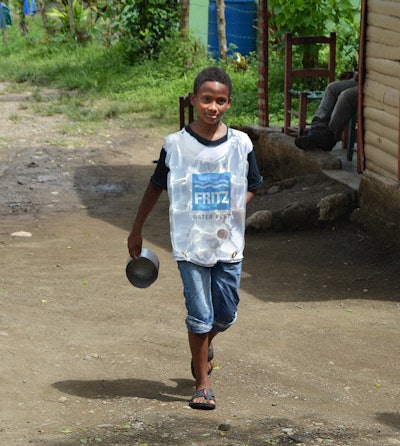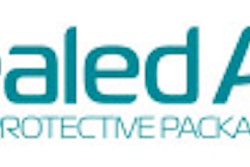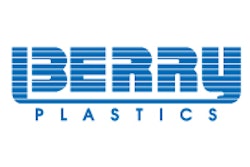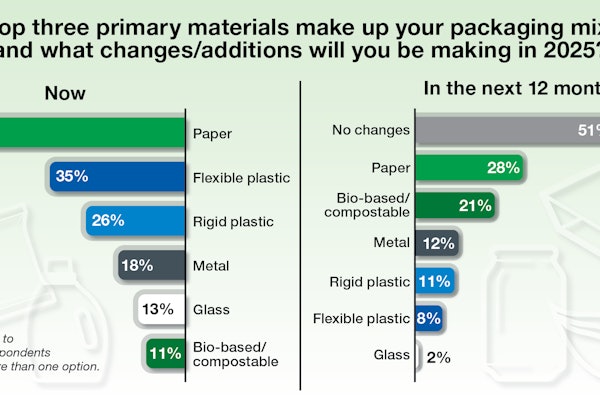The Fritz™ Water Vest from Solutions Inc., a not-for-profit company that utilizes current packaging technologies and attempts to create products that improve the quality of life for all people in the world, is the winner of this year’s Diamond Award in the annual DuPont Awards for Packaging Innovation.
This simple but appropriate packaging solution has been enthusiastically embraced in developing countries where water-transport issues exist. In remote areas of such countries, accessing drinkable water requires people—most often women and children—to spend many hours a day carrying heavy, unhygienic, and non-ergonomic containers on their heads and shoulders. This causes significant physical stress on their bodies over time and presents serious risk of water contamination. The Fritz Water Vest allows users to carry up to 20 lb of water safely and hygienically, with the weight evenly distributed across the chest and back. It’s an innovative application of modern packaging technology that solves water-access problems for at-risk populations.
The vest innovatively incorporates relatively new materials to accomplish two key functional needs. The multi-layer nylon structure provides a robust material suitable for rough terrain and multiple uses in dry and rugged environments. The proprietary lamination uses several layers for functional protection and allows for quick heat sealing during manufacturing. In addition, an additive included in the material inhibits the growth of mold, mildew, and odors. Together these properties provide a robust, hygienic, and reusable water-carrying and storage pouch. The Fritz Water Vest is an out-of-the-box solution for a significant global problem.
For more on this award-winning concept, visit pwgo.to/2946. —Pat Reynolds
Meet the ‘Pizza pod’
Zume Pizza has been named a Diamond Finalist Award Winner in the DuPont Awards for Packaging Innovation for their compostable “Pizza Pod,” which keeps pizza crisp and warm for longer periods. Most pizzas are delivered in square, cardboard boxes that consumers have accepted as the industry standard but that are prone to collecting grease and moisture. The Pizza Pod is optimized to absorb maximum oil and moisture, so pizzas stay hot and crispy long after leaving the oven. Composed of 100% sustainably farmed sugarcane fiber, the Pizza Pod is tree-free, compostable, and biodegradable, making it the most sustainable pizza box on the market. It also doubles as an elevated serving tray for the product.
The innovative container allows pizza shop employees to assemble boxes with less time and labor, and requires less shelf space compared to traditional paperboard boxes. Zume Pizza’s Pizza Pod also sustains brand equity, with the branding clearly presented up to the point of consumption. What impressed the DuPont judges were the design considerations given across the full lifecycle of the package—from sourcing, to retail to consumer experience. Details on who makes the pods and how they’re made were not available from Zume. —Pat Reynolds
Digital technology for enhancement
Winning a Diamond Finalist Award for MGI Group was the JETVarnish 3D Digital Print Decoration Process for Folding Cartons & Labels. This technology is a digital advancement and variable-data replacement for traditional foil stamping and print enhancement processes. It allows companies to achieve a premium branded look for their folding cartons and labels without the time, cost, and expense of using traditional dies, screens, or plates that have been needed in the past. Since the MGI process is 100% digital, the unique personalization and customization of text, data, and 3D designs can be achieved on each piece produced.
MGI has simplified the print production decoration process for brand owners and package printers. The JETVarnish 3D solution dramatically increases the speed and ability of packaged goods firms to bring new products to market at a lower cost. The workstation software offers rapid prototyping for new product launches and full high-volume production management.
Additionally, MGI has also created a new unique hologram-based, digital finishing security process. These variable data holograms are both decorative and functional as secure, anti-counterfeiting authentication imprints. For brand owners seeking more multi-sensory packaging to attract consumers at the point of sale, MGI has created the next level of digital print finishing technology.
It’s worth noting that the JETVarnish 3D product line was also recognized in last year’s DuPont Awards competition, winning a special Leadership in Innovation Award. It marked the first time such an honor has been granted in the history of this awards program (see https://www.packworld.com/article/packaging-excellence-personified). This year’s award was based on major enhancements and advancements made over the past year by MGI, including:
• New Artificial Intelligence registration system, the AIS SmartScanner, to improve detail accuracy and quality
• New Inline Corona Treatment for substrate management
• New Flexo Primer Coating Station on Roll-fed JETVarnish 3DW for Labels & FlexPack Apps
• Faster-drying varnish formula for improved durability
• New Image Editor software with expanded file management and texture library storage features
• New Machine Operation Computer with Variable Data Printing (VDP) Kit
• New Pallet Feeding & Stacking System
Adds MGI Marketing Coordinator Jack Noonan, “Since winning a DuPont Award last year, we’ve also released the JETVarnish 3D Evolution, the world’s first B1+ size digital enhancement press (sheet sizes up to 29x47 inches / 75x120 cm), and the JETVarnish 3DWeb, the world’s first roll-fed digital enhancement press (widths to 17 inches / 43 cm).” —Pat Reynolds
Light-weight PET for agrochemicals
Dow AgroSciences’ light-weight, sustainable, and stackable 15-L PET container for liquid agrochemicals has been named a Diamond Finalist Award Winner. The container provides considerable functionality in stacking and distribution while allowing greater ease of product dispensing than traditional containers. Dow Agrosciences took many design requirements into consideration and integrated them with stackability and pourability to enable added functionality to the lightweight containers. Addressing the whole value chain, Dow Agrosciences considered the distribution chain, end user, and the end of life for the package.
In addition to the stretch blow molded PET body, this container includes an injection-molded HDPE insert that is fitted beneath the neck ring of the body. Retal injection molds the container’s preform and sends it to an RPC-Promens facility in Ettlingen, Germany, or to an RPC-Promens-Innocan facility in Antwerpen, Belgium for stretch blow molding. Here’s how Dow Agrosciences describes the significance of the 537.5-g container:
“Comparing the currently used HDPE jerry cans with the new PET bottles, the weight is reduced by up to 30 percent per liter—including the total bottle weight as well as the top insert. The weight optimization of the PET bottles reduces the carbon dioxide footprint by 20 percent per liter of product content over the bottle’s lifecycle. The packaging of the bottles is also ergonomically designed, keeping the end user top of mind. These bottles have a large 63- mm centered neck allowing for the maximum amount air to enter during pouring, thus preventing glugging and splashing. This feature, in addition to the special bottle shoulder form, allows for efficient pouring and rinsing of the content. The neck is also compatible with existing Closed Transfer Systems (CTS) in current use. Farmers can handle the product easily and safely without contact with the product if needed by connecting the CTS on top of the bottle. Bottles use bore seal caps that do not require an induction seal, eliminating the risk for operator exposure to concentrated product when cutting the seal. Additionally, these bottles can be stacked up to three bottles on the pallet without the need for an outer case for transport. Feedback from farmers can be summarized as ‘very strong, rigid, and light container; handling and gripping are very good; elimination of corrugated cases is very much appreciated.’” —Pat Reynolds
High-barrier PLANTIC structure improves packaged meat shelf life
PLANTIC™ R is a high-barrier material manufactured via a process in which thin layers of polyethylene terephthalate (PET) are laminated to a core layer of renewably sourced PLANTIC™ HP sheet. The PLANTIC™ HP core provides gas barrier while the PET provides moisture/water vapor barrier to the structure.
The material, from Plantic Technologies Ltd. in Australia, was named a Diamond Finalist Award Winner in the DuPont Awards for Packaging Innovation.
Versatile and suitable for most thermoforming applications, including either rollstock or premade trays, as well as high-barrier packaging needs, PLANTIC™ R’s renewable content can be altered to meet specific requirements and/or the PET-recyclable content. It is said to dramatically increase the shelf life of packaged meats. In recycling, where typical multilayer films contaminate PET recycling streams, the solubility and biodegradability of the Plantic™ HP barrier layer allows that layer to wash away and biodegrade in the recycling process, while the PET is recovered.
In addition to being renewable and recyclable, the Plantic™ R packaging is said to require approximately half of the energy to produce than traditional fossil fuel plastics.
Plantic™ R’s on-pack communication provides easy-to-understand directions for disposing the tray and the film, since both are recyclable. Plantic™ enables retailers and brand owners to achieve their sustainability goals without compromising product quality, shelf life or performance. —Jim Butschli
OptiDure Abuse Bag addresses meat and cheese processing needs
Launched in North American last year, and in Europe in 2015, Sealed Air’s Cryovac® OptiDure™ Abuse Bag addresses product waste and inefficacy. Combining optical properties, a proprietary sealant, and overlapping sealing technology to reduce leakage, the OptiDure bag was a Diamond Finalist Award Winner in the 29th DuPont Awards for Packaging Innovation.
Used in vacuum-packaging applications, the bag is intended to help meat and cheese processors and retailers improve their operating efficiencies and brand image while sustainably addressing global food waste. OptiDure is a multilayer, coextruded structure that includes 75 μ/PVDC barrier.
It’s available in tubing widths from 200 mm to 450 mm. A factory seal can be applied as an end or side seal, depending on the customer application. For example, customers that use any type of automation in their loading process may prefer taped bags to feed through their machines. The same can be true for hand-pull applications to make it easier to remove bags from the carton. Bags may be printed or unprinted. A variety of sealing options are available, depending again upon customer application and product shape.
At press time, the names of customers using the bags could not be divulged, but PW was told that “a large Midwestern meat processor” was using OptiDure.
According to DuPont, OptiDure represents a significant breakthrough in vacuum packaging for protein, where there is a typical industry leaker rate of 3%. A 1% reduction in leaker rates could eliminate $140 million in food waste globally. OptiDure’s Overlap Seal Bag (OSB) technology enables improved seal integrity through contamination and wrinkles, which helps to facilitate faster throughput, increased production efficiency, and reduced product and package waste.
The bag offers multiple benefits, including the following:
• Durability. High mechanical abuse properties combine with improved burst strength and abrasion resistance, protecting the package throughout distribution.
• Reliability. Overlapping seal technology reduces leakers and improves seal integrity by sealing through contamination and wrinkles. The bag allows increased output and prevents sticking between bags.
• Aesthetics. Proprietary structure and composition deliver clarity and vibrant appearance to allow brands to “pop” and stand out in the case. Its shrink performance creates a high impact, case-ready package.
• Sustainability. Bag material is engineered to provide unrivaled abuse performance while using 25% less material. Serves as a “drop-in solution” for highly automated production lines.


























